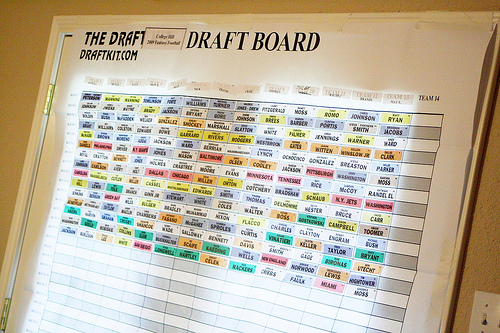Millions of American men consumed by fantasy
By Katie O'Brien

Millions of American men consumed by fantasy
By Katie O'Brien
Fathers, husbands, brothers and countrymen are lost to it each year. Tens of millions of men are consumed by it: Side effects often include selective hearing, lazy eyes, sleeplessness, mood swings and elevated blood pressure. It’s been known to both ignite wars and rekindle relationships. It’s fantasy football (and baseball if you’re into that sort of thing).
The Fantasy Sports Trade Association—yes, there’s a trade association—estimates that some 34 million Americans manage a fantasy franchise. The fantasy sport industry is a multibillion-dollar phenomenon that is altering the culture, consumption and economy of sports. Much has been made of Twitter’s explosion of users but Andrew Billings, a sports media expert and the Ronald Reagan Chair of Broadcasting at the University of Alabama, says media minds should pay more attention to the fantasy world. Recent Pew Research Center estimates put Twitter 10 million users behind fantasy sports.
But some media companies are paying very close attention. In NBA-like fashion, fantasy sport has a Big 3 of its own: ESPN, Yahoo and CBS Sports. ESPN knows fantasy players are very good customers: On average, fantasy viewers spend 22 hours each week with ESPN media—that’s three times more than the average Joe. That’s almost an entire day, each week, spent devouring ESPN! So imagine how you might feel if you spent all of your days with one such fan.
Fed up with the inordinate amount of time her husband of more than 10 years spent reviewing player statistics, drafting teams, managing lineups, making trades, and trash-talking with fellow fantasy league participants, Allison Lodish formed an online support group. Women Against Fantasy Sports was a forum for fantasy sports widows a hit with dispossessed wives and girlfriends. While now defunct, the site once boasted a few thousand registered members.
Perhaps some of the site’s former members are now team owners. Billings says that while women only represent around 10 percent of fantasy users (estimates vary between 10 and 20 percent), they are the fastest growing section of the population. According to a recent Yahoo article, female participation among women 12 to 17 and 55 to 64 is biggest—topping 45 percent in each group.
I myself am reluctant to rejoin the ranks of fantasy owners. I was excommunicated from a league in college after benching my number one overall pick, Alex Rodriguez, for the entire season amidst juicing allegations. After secretly convening a meeting with the league’s other owners, the commissioner issued the death penalty to my team (its name must remain anonymous because it is both inappropriate and innocent of all charges). I stand by my decision and sleep soundly that my record remains asterisk free.
The bottom line is that most of us will never play a professional sport. And, Billings says, most of us don’t look at LeBron James and think, “I could do a better job than this guy.” But ask your average fan if they could run a team better than a given general manager and many would consider themselves a qualified candidate.
So before fantasy football begins—and Bears fans start sending in their resume’s for Phil Emery’s new gig as GM—Afternoon Shift takes a look at the history, evolution and impact of fantasy sports. Jason Marck, devoted, fantasy-free fan, is joined by Billings and a slew of other sports fans: Adam Kurland, director of ESPN’s 30 for 30 film Silly Little Games; fascist fantasy overlord and executive producer of WBEZ’s Middays, Justin Kaufmann; and Marc Edelman, aka the Sports Judge. Edelman’s primary occupation is professor at Barry University Law School and a legal consultant to the fantasy sports industry—but he’s also spent the last several years settling fantasy disputes for feuding owners.
